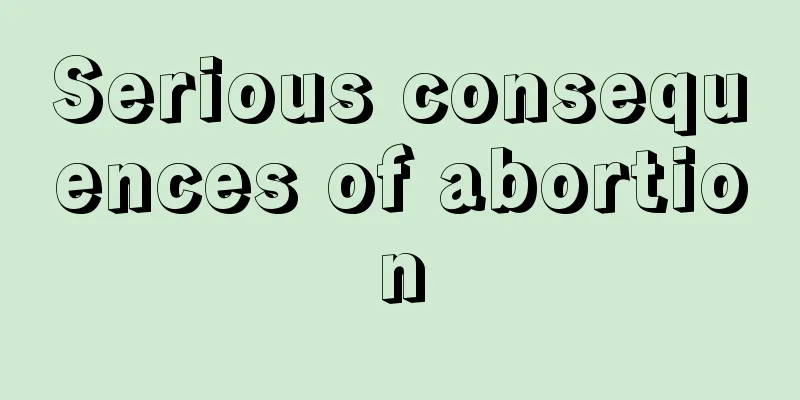Dry stool and anal fissure bleeding after childbirth

|
Anal fissure is a small ulcer caused by a tear in the skin layer of the anal canal below the dentate line. Its location is parallel to the ordinate of the anal canal, about 0.5 to 1.0 cm long, fusiform or oval, often causing severe pain and difficult to heal. Surface lacerations of the anal canal cannot be considered anal fissures because they heal quickly and are often asymptomatic. The clinical symptom of postpartum anal fissure is pain after defecation. In severe cases, the pain after defecation lasts for several hours, making the patient afraid to defecate. As a result, the excrement stays in the intestine longer and becomes drier, making the next defecation painful, resulting in polarization and unbearable pain. Postpartum anal fissure Postpartum anal fissure Many pregnant women suffer from anal fissures after giving birth. Anal fissures are a very common disease among women after childbirth. Pregnant women are very prone to anal fissures. In addition to being caused by vaginal dilation and tearing that invades the anus during childbirth, it is mainly caused by constipation. Research data show that 76.4% of postpartum women suffer from constipation, and 70.6% of those with anal fissures suffer from constipation. Postpartum anal fissure Postpartum anal fissure injury Injury 1: Blood in the stool Blood in the stool is a major clinical symptom of anal fissure, which mainly manifests as bleeding during defecation or blood on toilet paper after defecation. Most of the bleeding is fresh. Although the bleeding is small each time, long-term bleeding can still cause anemia and harm your health. Injury 2: Pain Pain is another major symptom of anal fissure and a key reason for patients to seek medical treatment. The pain of anal fissure is quite prominent, presenting as tearing pain or burning pain. The pain is so intense that patients generally cannot tolerate it. In severe cases, it can make the patient uneasy and seriously affect the patient's normal daily life and work. Harm three: constipation Constipation is the cause of anal fissure and also the adverse effect caused by anal fissure. It can interact with anal fissure and produce polarization, which aggravates constipation and makes anal fissure unable to heal. Injury 4: Anal fissure pentad If anal fissure is not treated promptly in the early stage, three symptoms will appear: hypertrophy of the anal papilla, anal canal ulcers and sentinel hemorrhoids, collectively known as the "anal fissure triad". If the condition worsens further, it will continue to cause anal sinusitis and anal fistula, which together with the "anal fissure triad" are collectively called the "anal fissure quintuple syndrome". Once the "anal fissure quintuple syndrome" appears, it means that the patient's condition is quite serious. [1] Postpartum anal fissure prevention measures Women should pay great attention after giving birth. First of all, you should pay attention to participating in some activities as much as possible during pregnancy (unless there are contraindications to activities). Generally, you don't have to stay in bed all day. Those who give birth naturally can get up and move around 1-2 days after giving birth. When you first wake up, you can do light activities such as knee bending, push-ups, anal contractions, etc. This is very helpful for improving abdominal muscle capacity, exercising bone-poor muscles, assisting defecation, and accelerating recovery. During pregnancy, you can exercise moderately under the guidance of a doctor. More importantly, you should eat properly. In addition to eating chicken, meat, fish, eggs and other foods, you should also try to eat some vegetables, fruits and whole grains, legumes and products. You can also eat some foods such as sweet potatoes in moderation. Drink more water and porridge to maintain body hydration. Eat less or no hot or irritating food, and eat more fish head soup and pig trotter soup to help moisturize the stomach and intestines and replenish sufficient water to prevent constipation. In short, avoiding maternal constipation is the key to preventing postpartum anal fissure. Once constipation occurs, seek medical treatment immediately. |
<<: Drink less amniotic fluid and go to the toilet all the time
>>: What are the benefits of eating sesame oil for pregnant women
Recommend
Does liposuction surgery really cause loss of libido?
The lip knife is a professional technology for mi...
What is micro-tube painless abortion?
Life is always full of surprises, and sometimes w...
How to treat breast hyperplasia effectively?
Patients with breast hyperplasia are no different...
Where are the crabapple flowers mainly distributed? What are the functions of the crabapple flowers?
The crabapple tree is a famous ornamental tree sp...
Is it normal to have a foul smell during vaginal discharge?
Under normal circumstances, women's leucorrhe...
Flat chest self correction
Flat chest has a great impact on the body shape, ...
Can I eat plums during early pregnancy?
It is best not to eat too many plums in the early...
What is the cause of bleeding during ovulation?
Ovulation bleeding is a common phenomenon among w...
What should women eat to nourish their liver?
The liver actually occupies a very critical part ...
What to do if anemia occurs during pregnancy?
Anemia during pregnancy is anemia symptom that on...
This disease specifically harms children, has a mortality rate of up to 30%, and is spread by mosquitoes...
The most enjoyable thing about summer is eating i...
The lady has back pain, weak legs and no strength in her legs
In real life, many women are prone to back pain, ...
What is the ACL injury that made Gu Ailing cry for 30 minutes? How important is it to athletes?
A few days ago, Gu Ailing posted on her personal ...
Where does the soul of the child go after induced abortion?
Most of us have no idea where the soul of a baby ...









